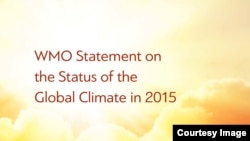The World Meteorological Organization reports that in 2015, records were broken with the year being the hottest, driest and wettest ever. WMO launches annual State of the Climate report in Geneva.
The World Meteorological Organization reports global warming is occurring at a much faster pace than previously predicted. WMO scientists say the alarming rate of change occurring in the Earth’s climate is the result of greenhouse gas emissions and is unprecedented.
The report finds global average surface temperatures in 2015 broke previous records by a wide margin, and the streak will continue as January and February of this year set new monthly records.
WMO Secretary-General Petteri Taalas says the Earth today is already one degree Celsius hotter than at the start of the 20th century, halfway to the critical 2-degree Celsius threshold.
“This warming trend is continuing, so there is no plateau and ... partly it is because of the strong El Nino that we were facing last year; but, it also is showing that this climate change warming trend is continuing," said Taalas.
He adds once the 2-degree Celsius threshold is attained, more extreme weather events than those experienced in 2015 will occur.
The WMO report finds last year, sea level rise was the highest recorded. It says the Arctic Sea ice on February 25, 2015 was then the lowest on record and was lower this past February.
The report cites intense heat waves in 2015 in Asia, South America, western and central Europe, as well as the U.S. northwest and western Canada, which suffered from a record wildfire season.
It says many countries suffered extreme rainfall, including those in Africa, notably Malawi, which had the worst flooding in living memory. It also says severe drought affected Ethiopia and southern Africa with negative repercussions for agriculture and human health.
WMO chief Taalas tells VOA he expects the 2-degree Celsius threshold to be reached by 2030, decades earlier than previously projected. He says the point of no return is coming faster than thought, so nations must stop emitting carbon dioxide into the atmosphere immediately by moving from fossil fuel to renewable energy.










